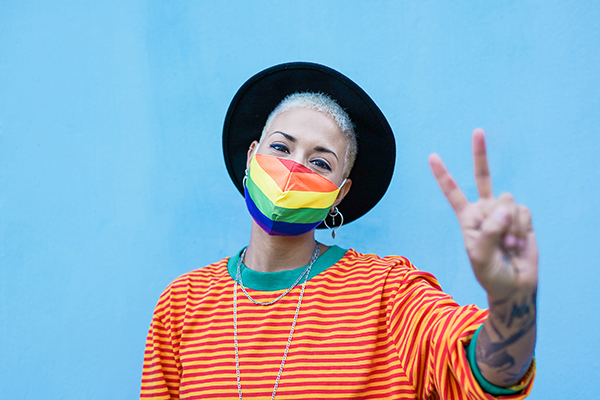This question seems ultra-relevant, given our tremendous focus on how to find and keep a mate. Research indicates at least 50% of lesbians over the age of 50 are single, so are they all unhappy? And common sense will remind you that many married people are miserable. So should we shift focus from finding happiness in “the One” to finding it in Oneself?
Yes, and…this seems to be a “power in the paradox”moment. Because both are true. Studies of happiness show that much of it depends on attitudes and behaviors, regardless of relationship status. And if other factors are equal, people who are married do seem to be happier than their unmarried cohorts. But being married to someone you don’t respect or trust or enjoy being around isn’t necessarily better than being single. Giving up on intimate relationships isn’t very promising, either. So what to do?
Seems like it comes down to doing two things at the same time: (1) cultivating the attitudes and activities that increase personal happiness, and cultivating opportunities for intimate connections.
The happiness research has identified several characteristics of people who are happier. Broad social networks, regular exercise routines, and acts of kindness are really important. If anyone ever encouraged you to focus on helping others in order to make yourself feel better, they were right–acts of altruism raise happiness more than self-indulgences. And gratitude for what you have can really turn a dark mood brighter.
Supposedly the Dalai Lama said the secret of happiness is to identify the things you enjoy, and do more of them. Also, he recommended doing less of things that make you miserable. I like this! If you truly love painting or drawing or playing music, do it more often. And if small children annoy you, don’t be an elementary school teacher. On a more immediate level, if you know you’ll get depressed staying home alone all weekend, by all means make social plans. Suffering alone isn’t beneficial.
The one thing NOT to do is to think that finding the right person is going to make you happy. Turns out we seem to have a happiness “set point,”so that after a few months of joy about a new partner we tend to revert to our usual level of happiness. So it’s in everyone’s best interest to cultivate activities and attitudes that increase happiness.
And yet, finding that right person does meet a basic longing…we seem to be born to bond, to feel more complete with an intimate partner. Said partner rarely appears spontaneously. Some intentional cultivation of opportunities is essential–in other words, you probably need to date.
There are many guidelines for dating, most of which focus on where to meet like-minded people, how to handle online dating, how to set realistic expectations and protect oneself from danger…I’d like to focus on how to be the person you’d like to date. To me, this comes down to two things: improving your communication skills, and pushing yourself to be proactive.
Most of the single lesbians I know do some form of dating at least occasionally, and there is one complaint I hear more than any other. “She talks too much.” Apparently, many women are under the impression that others are actually interested in listening to chatty monologues. Most often, they’re not. They’re just being polite and wondering if/when they might get a chance to talk about themselves. Often, they walk away wondering–did she learn anything at all about me?
To be fair to the over-talkers, if you’re an under-talker you are putting pressure on the other person to fill the space, so step up to the challenge. If the monologue turns into a dialogue, good for you. If not, then you’ll know you’re with a talker, and can decide if you want more of that. Do you enjoy this, or is it making you miserable? Proceed accordingly.
As for being proactive…well, someone’s got to do it, and it might as well be you. Otherwise you’ll be stuck in a passive position where you’ll feel either ignored or controlled–neither of which is good for self-esteem. ‘Ideally people will share the responsibility for making things happen, for choosing the next place or activity or step in relationship development. ‘But the only way to find out if you can have an equal partnership is to do your share of the heavy lifting and see how she does hers.
The great thing about being proactive is-you’ll be glad you did! ‘Stepping up, taking responsibility, initiating connections–these are mostly very good for self-esteem. ‘Of course, it’s disappointing and maybe even embarrassing to get turned down, but in the big picture the benefits of proactivity far outweigh the costs. Even if the other person lets you down, you don’t let yourself down.
And that comes back around to the initial question: Can you be single and happy at the same time? ‘I think yes, you can. You can take some pride in taking responsibility for your own happiness, ‘honor the urge to bond, and give it your best effort.
Beyond that, who knows? ‘Most of us are old enough to know that many things don’t turn out as expected. Â The best we can do is keep doing our best to communicate well, be proactive, and trust the process. As they say, it’s about the journey, not the destination.
Dr. Glenda Corwin is well-known for her work with sexual intimacy issues, described in her book Sexual Intimacy for Women. In addition to being a national speaker on this topic, she’s been on many radio programs including NPR’s Out in the Bay with Marilyn Pittman and The Frankie Boyer Show. She also writes for the Huffington Post and Epochalips, and was recently featured in Curve Magazine. Find out more at drglendacorwin.com



